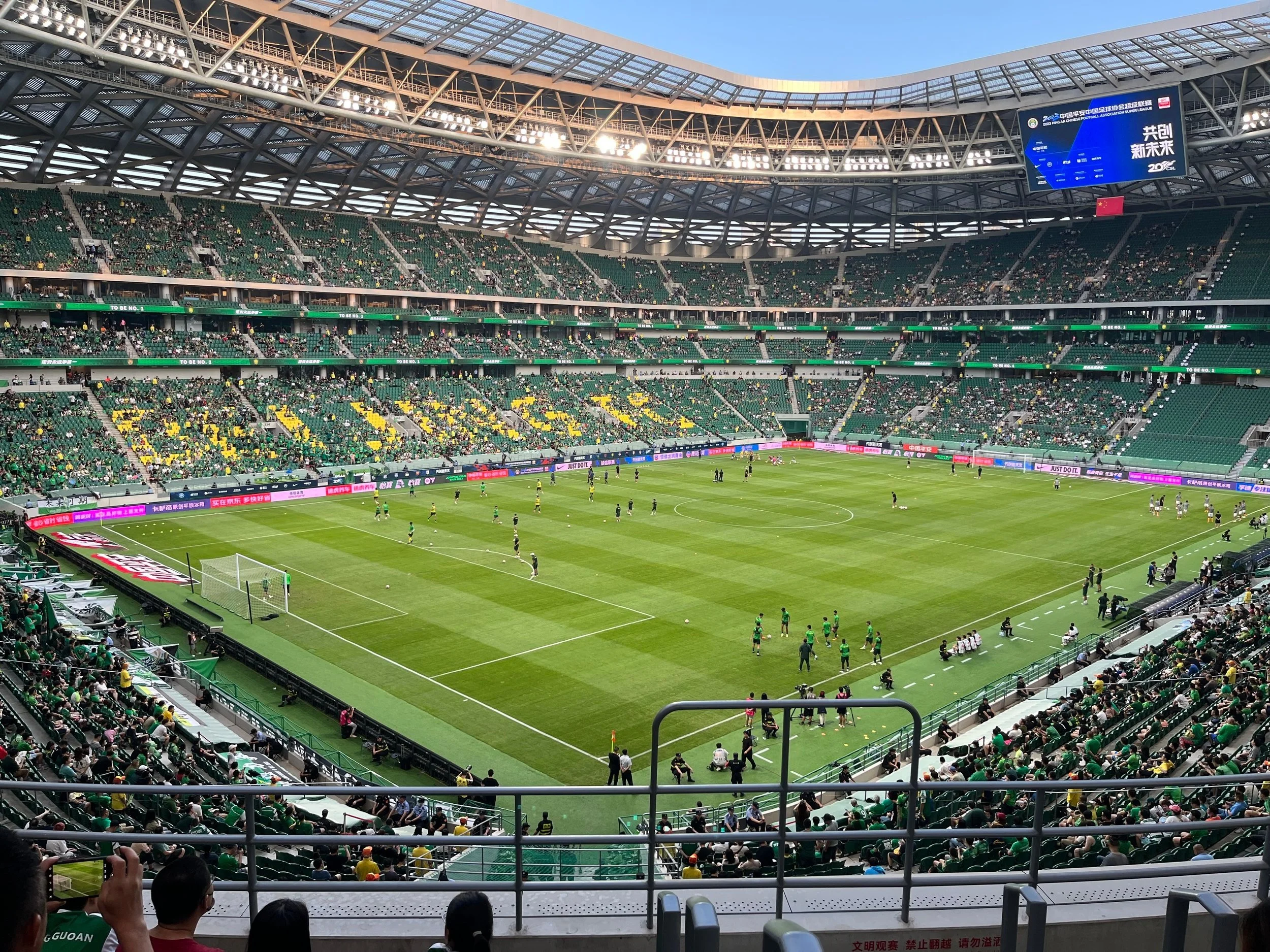Beijing Guoan 2 - Qingdao Hainiu 0
Okay, so yeah, it’s a bit of a stretch to call this a match report, but since this will be focused on the soccer portion of the evening, we’re going to keep up the facade.
The problem is I don’t know much about the home team, Beijing Guoan, and even less about their opponents, Qingdao Hainiu. Both teams sit on opposite ends of the middle third of the table, and the local squad seems to have found a good vein of form.
But in the first half, both teams gave every indication they were comfortable with their spot in the table, neither willing to risk it by showing ambition. A marked lack of intensity reminded me more of the preseason exhibition matches European clubs play this time of year.
Soccer fans could say teams were feeling each other out. That would require a modicum of risk-taking–passes or plays seeking to get in behind, a few ambitious choices to test and probe how the other team would respond. But when those opportunities presented themselves, they were rarely, if at all, taken.
The pace of play needed to be quicker in decisions and execution. And it was unclear if they either didn’t see the open passes or didn’t have the confidence to pull them off.
(I found out after the match that several players for the Beijing side were injured, but since I don’t know enough about the team, I don’t know how much of an impact their absence had on the proceedings.)
When scoring opportunities did arise–and this was the case for both teams–the quality of the final product left much to be desired. Both teams squandered a handful of clear-cut chances that players of a higher caliber would finish off in their sleep.
I honestly considered leaving when the match got to halftime. They didn’t serve beer at the stadium, or that’s what someone explained. The food was nothing to write home about. And the football needed a lifeline.
I’m glad I stayed, though. After taking the midmatch break to stretch, hit the head, and walk around the stadium a bit more, I returned to my seat. The usher in my section tried on his vast English vocabulary by saying “mustache” and “beard” with a smile and nod as I passed. It was unclear if he was trolling or attempting to be welcoming.
Almost immediately from the restart, the lifeline that the match needed was either found in the locker room or in some moment of inspiration on the pitch. I could tell this forty-five minutes would be different.
Six minutes in, that newfound intensity led to the opener from the North Macedonian former Dynamo Zagreb midfielder Arijan Ademi. He latched on to a rebound off a shot from the left winger, who had somehow wriggled free of his defender and had his shot punched back into the middle of the box by the goalkeeper. Ademi took the looping ball down with his chest, that touch also beating the first defender, then struck it back across the goal with his left foot beating the off-balanced netminder.
It was one of those goals you sensed was coming. Experienced fans know what I’m talking about. All the tiny pieces of action, collecting like the grounds of coffee at the bottom of a cup of Turkish joe, suggested a goal was imminent. Ask us to describe those details, the data points leading us to those conclusions, and we’ll point to the field and mumble something about vibes.
As is often the case, the goal opened things up. The intensity built in the first five minutes accelerated as Qingdao sought to chase the game, and Beijing did everything they could to hold on to it. Tackles had a bit more venom, players tracked more closely. We finally had ourselves a game.
When Beijing Guoan inserted their new signing, Angolan striker Fabio Abreu, he brought with him that extra bit of quality I was searching for throughout the match. The local team played with a traditional number 9–a target man who could hold up play or flick the ball on, staying high to stretch the defense vertically.
Abreu took a few minutes to settle in, but once he did, it was clear why they signed him. His touch and hold-up play allowed for more efficiency in transition and, ultimately, possession. And when he distributed the ball, he almost always found the most dangerous player. Off the ball, he caused the supporting defenders fits with his movements both laterally and vertically.
All of that effort paid off in the 79th minute. Abreu receives and controls a clearance from a teammate. He’s about 10 yards inside their attacking half. The first touch was away from the goal, defenders from Qingdao started to close him down as he turned and faced their goal. His second touch is pushed into the space the defenders have left open. A Beijing Guoan winger is rushing into an open area to his right.
Fans stood in anticipation.
Abreu, cooly, calmly, slots the ball through the defenders into the path of his teammate sprinting forward. The sprinting teammate received it with no one to beat except the goalkeeper. A touch to settle it, a touch to get the on-rushing netminder to commit one way or another, and finally, a shot blasted into the back of the net.
It was the insurance goal Beijing Guoan needed, killing off any hopes of Qingdao stealing a point they didn't deserve.
After ninety minutes, I walked away from the match, feeling that the level of play would need to improve if the league had any genuine vision of getting out of the covid induced malaise over the last few seasons. If Fabio Abreu was any indication, they’re well on their way to doing just that.
If I had to draw a comparison, these two teams, in terms of quality, would fit in at the bottom rungs of Major League Soccer and the mid to bottom half of the table of League One in the UK pyramid. But, they would struggle there, too, as their intensity, the level of physicality pales in comparison to what is on display in either of those two leagues.
That may mean there are a few more seasons where the league struggles. But maybe that’s okay. Slow organic growth is probably preferable anyway. If the ultras provided insight into where the locals stand, they’re quite okay with that, at least for now. They cheered and sang for the entirety of the ninety minutes. Forty-five-plus thousand fans watching this level of football is undoubtedly a positive indicator of demand.
I’ll be back again, and hopefully, I’ll likely have to adjust my assessment. And that’s okay. Hopefully, I’ve learned more about the home team next time.




